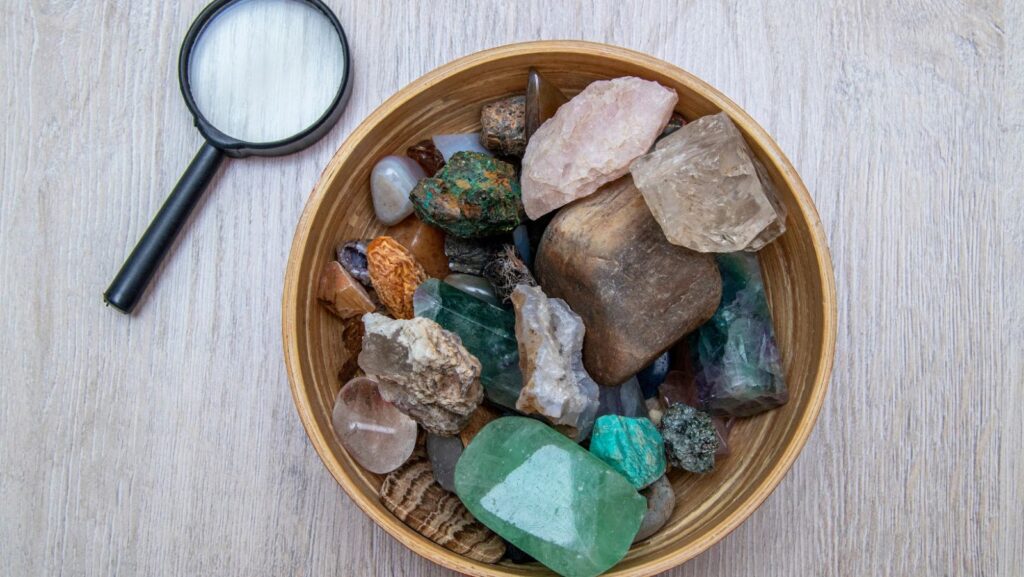The Definition Of A Mineral And Why It Matters To You

Are you feeling a little lost when it comes to the topic of minerals? Do you ever find yourself thinking, “What is a mineral, anyway?” While the dictionary definition of a mineral is “a naturally occurring, inorganic solid with a definite chemical composition and a crystal structure,” that doesn’t really help us understand what minerals are or why they matter.
So, let’s explore the definition of a mineral and why it matters to you.
What is a mineral and what are its properties
A mineral is a naturally occurring, inorganic solid with a definite chemical composition and a crystal structure. In order for a substance to be classified as a mineral, it must meet all five of the following criteria:
- Naturally occurring: Minerals are not man-made. They occur naturally, forming in the earth through geological processes.
- Inorganic: Minerals are not alive. They do not contain carbon-based molecules, which are the building blocks of life.
- Solid: Minerals are solids at room temperature and pressure.
- Definite chemical composition: Minerals have a specific chemical composition, which is what gives them their unique properties.
- Crystal structure: Minerals are arranged in a repeating, three-dimensional pattern called a crystal lattice.
How do minerals form and how are they used
Minerals form in the earth through a variety of geological processes. They can be formed by the crystallization of magma or precipitation from solution. Some minerals are even created by the metamorphism of rocks a process in which rocks are changed by heat and pressure.
Once formed, minerals can be used in a number of ways. For example, they can be used as building materials, jewelry, or even as a source of food (e.g. salt).
The importance of minerals in our everyday lives
Minerals are important to us because they are the building blocks of rocks, which make up the Earth’s crust. The Earth’s crust is made up of a variety of different rocks, which are used for a variety of purposes, including construction, manufacturing, and even food production.
Rocks and minerals are also important to us for another reason: they contain a variety of valuable elements and compounds that are essential for life. Minerals such as iron, copper, and magnesium are essential for the formation of blood cells. Other minerals, such as sodium and potassium, are essential for the proper functioning of our nervous system. And still other minerals, such as calcium and phosphorus, are essential for the development and maintenance of our bones and teeth. In short, minerals are essential for both the Earth and for life itself!
is a crystal a mineral
Yes, a crystal is a type of mineral. A crystal is defined as a naturally occurring, inorganic solid with a definite chemical composition and a repeating, three-dimensional pattern called a crystal lattice.
The benefits of using natural minerals in cosmetics and skincare products
Minerals are used in a variety of cosmetics and skincare products for a number of reasons. Minerals such as zinc oxide and titanium dioxide are often used as sunscreen ingredients because they provide natural sun protection. Minerals such as iron oxides are also used in cosmetics to add color. And finally, minerals such as kaolin and bentonite are often used in skincare products because of their absorbent properties.
Minerals are also prized for their natural, healthy properties. Many minerals are known for their anti-inflammatory, antibacterial, and antioxidant effects. For example, zinc oxide is known for its ability to soothe skin irritations such as acne, while copper is known for its ability to reduce the appearance of wrinkles. In short, minerals offer a wide range of benefits for both the skin and the body. And because they are naturally occurring, they are also considered to be safer and more gentle than synthetic ingredients. Always check the label of your cosmetics and skincare products to see if they contain any minerals.

 Reliable Insurance Brokers at Pacific Prime – Tailored Plans
Reliable Insurance Brokers at Pacific Prime – Tailored Plans  Here’s Everything You Need to Know About Botox Before Your First Shot
Here’s Everything You Need to Know About Botox Before Your First Shot  Walking as a Tool for Better Mental Health
Walking as a Tool for Better Mental Health  How to Recognize Early Signs of Addiction and How to Seek Help
How to Recognize Early Signs of Addiction and How to Seek Help  Restoring Your Thinning Hair Line
Restoring Your Thinning Hair Line  The Role of Exercise in Recovering from Alcohol Use Disorder
The Role of Exercise in Recovering from Alcohol Use Disorder